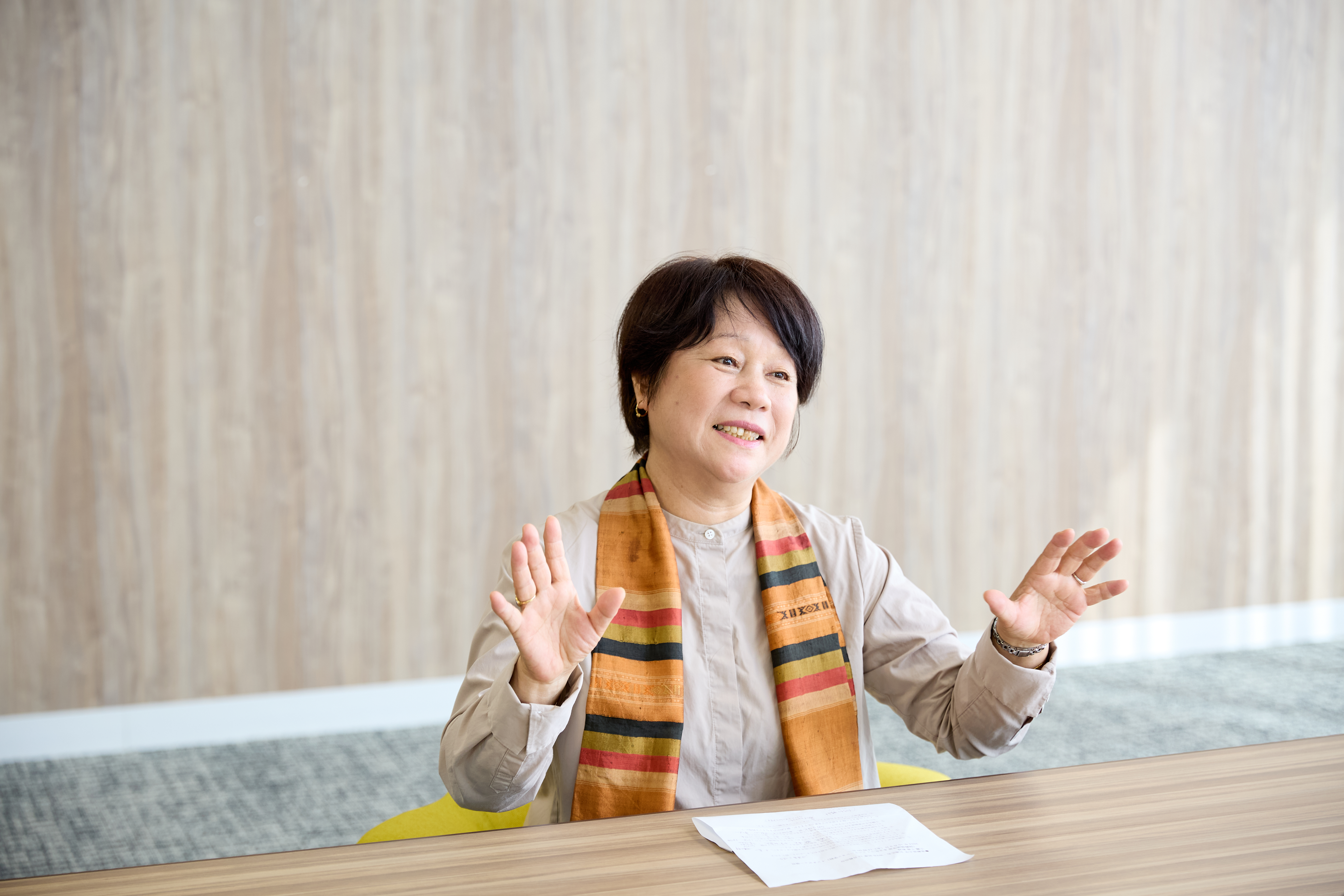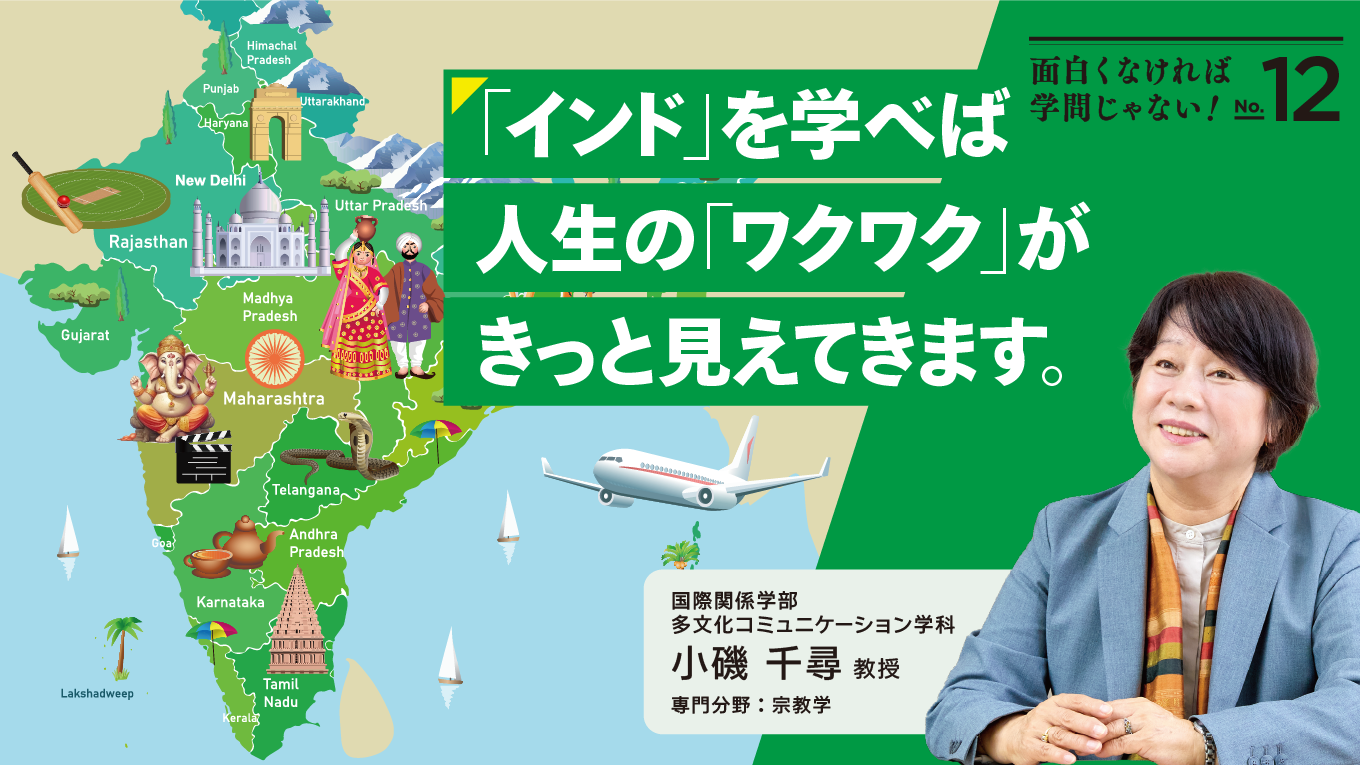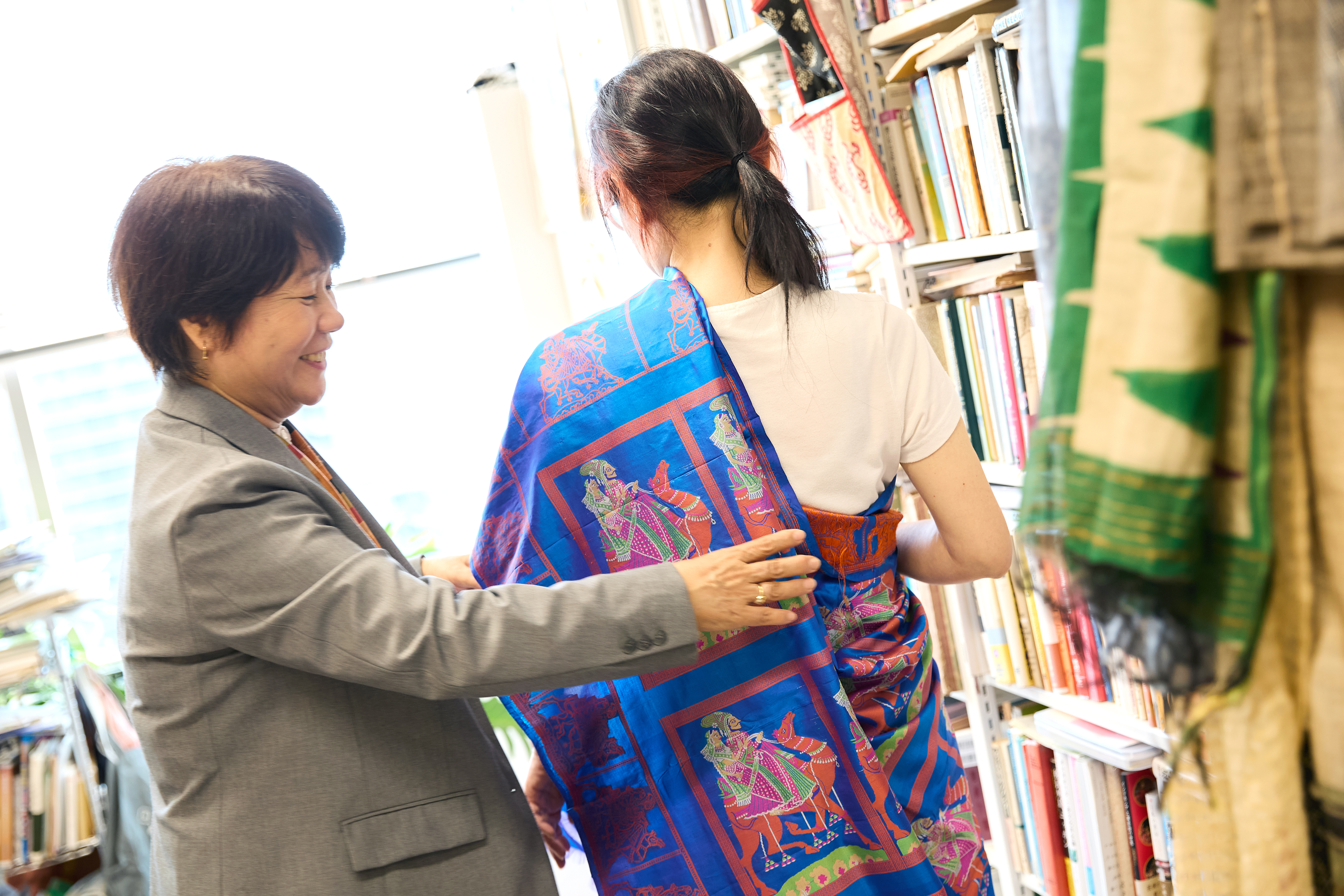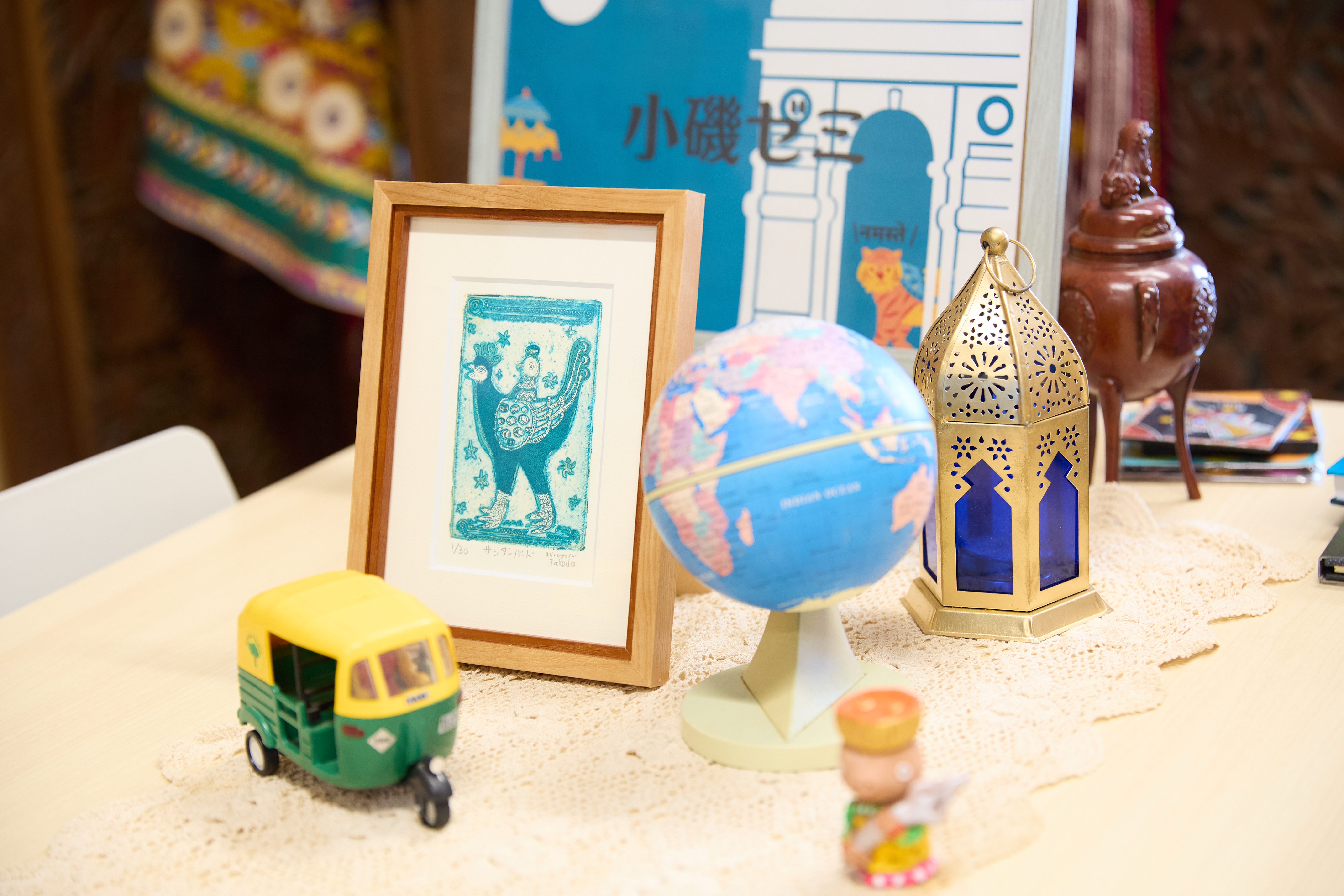
If you study "India"
The excitement of life
You will surely see it.
The excitement of life
You will surely see it.


#Asia University research
KOISO Chihiro Professor
Faculty of International Relations Department of Multicultural Communication
2024.12.01
In the series "If it's not interesting, it's not academia!", we introduce the research content and anecdotes of faculty members at Asia University. The 12th installment features Professor KOISO Chihiro Department of Multicultural Communication Faculty of International Relations.

For some reason, I've loved India ever since I was old enough to understand.
This love for India only grew as I grew older, and finally, during my university days, I went on my first trip to India, a place I had always dreamed of visiting, with two female friends.
My destination was Mumbai (formerly Bombay), a big city on the west coast of India facing the Arabian Sea. When I landed and stood on the plane's stairs, I was enveloped in a stuffy, hot air and I had a strong feeling that I wanted to live here. Even though I hadn't set foot on Indian soil yet. Some people may find the air in India "smelly," but for me it was a wonderful, relaxing scent.
My first trip to India lasted more than a month, and wherever I went, it was fun and very memorable. As I continued traveling, my desire to live in India one day became stronger and stronger, and my friends calmed me down when I started to cry, "I want to study in this country! How can I live in India?" (laughs). However, at the time, I never imagined that I would become research of Indian thought and culture. It had nothing to do with academia, I just loved India and wanted to live here.
Pursuing what he wanted to know and where he wanted to live led him to become research

In order to live in India, it is necessary to learn Hindi, the official language of India. After graduating from university, I learned only the basics of Hindi in Japan, and then went to India to start studying Hindi at a language school. However, this was not a study abroad experience that focused on studying, but rather I learned the language and culture while enjoying life and travel in India.
Hindi uses the Devanagari script, which seems like a coded alphabet. At first glance, it seems like a very difficult language, but in fact the word order is the same as in Japanese, and the pronunciation of vowels is simpler than in English, so it may be an easier language for Japanese people to learn. I am currently teaching Hindi at Asia University. It is very rare to find a university in Japan where you can study this language, so I would encourage students who are interested in India to take on the challenge.
At that time, I lived in a town called Wardha in the state of Maharashtra, in the middle of the vast India. Wardha itself was a rural town, but it was conveniently located to get anywhere by train, so I backpacked around India. India is a country so large that it could fit the entirety of Europe, so there are different cultures, languages, and races from east to west, north to south, and you never get bored no matter how much you travel. The people of southern India are modest, relaxed, and comfortable, but the part of India I like is the northeastern region of the Ganges River basin. The people here have the strength to express their feelings directly, and some of them will even say "Let's get married!" as soon as they see a young girl (laughs). But I loved the energetic and honest Indian people.
Hindi uses the Devanagari script, which seems like a coded alphabet. At first glance, it seems like a very difficult language, but in fact the word order is the same as in Japanese, and the pronunciation of vowels is simpler than in English, so it may be an easier language for Japanese people to learn. I am currently teaching Hindi at Asia University. It is very rare to find a university in Japan where you can study this language, so I would encourage students who are interested in India to take on the challenge.
At that time, I lived in a town called Wardha in the state of Maharashtra, in the middle of the vast India. Wardha itself was a rural town, but it was conveniently located to get anywhere by train, so I backpacked around India. India is a country so large that it could fit the entirety of Europe, so there are different cultures, languages, and races from east to west, north to south, and you never get bored no matter how much you travel. The people of southern India are modest, relaxed, and comfortable, but the part of India I like is the northeastern region of the Ganges River basin. The people here have the strength to express their feelings directly, and some of them will even say "Let's get married!" as soon as they see a young girl (laughs). But I loved the energetic and honest Indian people.
Is "Jugaal" the driving force behind Indians' global success?

Even after living in India for four years, my desire to know more about India did not fade. So I decided to study at Graduate School, majoring in philosophy at Graduate School of Pune. Pune, in Maharashtra, where the university campus is located, is an academic city that is comparable to Cambridge and Oxford in the UK, where national research institutes and universities are concentrated. It is located on a plateau, so it is more comfortable than the summer in Japan. During my master's course, I met my husband, who was studying abroad from Japan. After returning to Japan and getting married, we returned to Pune University together and proceeded to the doctoral course, and both of us decided to follow the path of research.
I have mainly been research the philosophy of Hinduism, the largest religion in India. I still visit India once a year to conduct fieldwork on the lives and culture of the people of Maharashtra, where I first lived, particularly their food culture and religion. I have also published a book for the general public about Indian food culture. In recent years, I have also been focusing on fieldwork on incense, or fragrance, used in religious ceremonies.
Incidentally, India is now making its own unique presence known in the international community. For example, in the US, the number of Indian managers is increasing in many companies, including Silicon Valley, and the former Prime Minister of the UK was of Indian descent. Furthermore, in Japan, the current CEO of Kameda Seika, a leading manufacturer of arare and senbei rice crackers, is also an Indian who was research at Osaka University and Nagoya University. In this way, Indians are making remarkable achievements overseas, and I believe one of the reasons for this is the concept of "jugaar," which is often used by Indians.
"Jugirl" simply means a "quick fix." It is a word used to describe the situation when you are faced with a difficult problem and don't have the time or means to solve it, so you make do with whatever materials you have on hand, or even bend the rules a little to solve it.
Even in situations where most people would give up, many Indians have a "Jugaal" spirit that makes them "try to overcome it somehow" by making full use of their limited means. Hinduism is a polytheistic religion that incorporates the gods of many regions, and its tolerance can also be said to be based on this "Jugaal." It is said that this is now being taken up as a topic in "management philosophy" Lecture at American universities.
I have mainly been research the philosophy of Hinduism, the largest religion in India. I still visit India once a year to conduct fieldwork on the lives and culture of the people of Maharashtra, where I first lived, particularly their food culture and religion. I have also published a book for the general public about Indian food culture. In recent years, I have also been focusing on fieldwork on incense, or fragrance, used in religious ceremonies.
Incidentally, India is now making its own unique presence known in the international community. For example, in the US, the number of Indian managers is increasing in many companies, including Silicon Valley, and the former Prime Minister of the UK was of Indian descent. Furthermore, in Japan, the current CEO of Kameda Seika, a leading manufacturer of arare and senbei rice crackers, is also an Indian who was research at Osaka University and Nagoya University. In this way, Indians are making remarkable achievements overseas, and I believe one of the reasons for this is the concept of "jugaar," which is often used by Indians.
"Jugirl" simply means a "quick fix." It is a word used to describe the situation when you are faced with a difficult problem and don't have the time or means to solve it, so you make do with whatever materials you have on hand, or even bend the rules a little to solve it.
Even in situations where most people would give up, many Indians have a "Jugaal" spirit that makes them "try to overcome it somehow" by making full use of their limited means. Hinduism is a polytheistic religion that incorporates the gods of many regions, and its tolerance can also be said to be based on this "Jugaal." It is said that this is now being taken up as a topic in "management philosophy" Lecture at American universities.
We need excitement to have the energy to live

Through my life in India, I learned the importance of taking on challenges with a "no-brainer spirit" that is also found in "Jugal." Even if they fail, Indians laugh it off, saying "no problem," and move on to the next challenge. To Japanese people, this may seem brazen and careless. However, from the Indian perspective, it seems strange that young people in Japan are reluctant to take on challenges and become mentally ill after failing once or twice.
I also want the young people I teach to have "Jugirls" and "the spirit of trying hard," the energy necessary to live. To do this, it is essential to be curious about everything and find something that truly excites you. I have been excited about "India" since I was young, and I never get bored of it. Through my classes and seminar activities, I would like to convey to my students at least a little of the fun and endless charm of India.
At first, an interest in Indian food and movies is enough. I have many interesting stories about "Jugaar" that I experienced in India, so if you are interested, please come visit my Research Office. I can also introduce you to delicious Indian restaurants in the metropolitan area, and I can teach female students how to wear the traditional Indian dress, a sari.
I believe that by coming into contact with the lifestyles and culture of Indian people, which are different from those of Japanese people, the younger generation will surely change the way they view the society around them and themselves. Let's find something that truly excites you together through the filter of the different culture of India!
I also want the young people I teach to have "Jugirls" and "the spirit of trying hard," the energy necessary to live. To do this, it is essential to be curious about everything and find something that truly excites you. I have been excited about "India" since I was young, and I never get bored of it. Through my classes and seminar activities, I would like to convey to my students at least a little of the fun and endless charm of India.
At first, an interest in Indian food and movies is enough. I have many interesting stories about "Jugaar" that I experienced in India, so if you are interested, please come visit my Research Office. I can also introduce you to delicious Indian restaurants in the metropolitan area, and I can teach female students how to wear the traditional Indian dress, a sari.
I believe that by coming into contact with the lifestyles and culture of Indian people, which are different from those of Japanese people, the younger generation will surely change the way they view the society around them and themselves. Let's find something that truly excites you together through the filter of the different culture of India!
Related Links
- Faculty of International Relations TOP
- Faculty of International Relations Department of Multicultural Communication
- Four years of study Department of Multicultural Communication Faculty of International Relations
- Faculty of International Relations Department of Multicultural Communication Introduction
- Faculty of International Relations Department of Multicultural Communication Seminar
- Faculty of International Relations Department of Multicultural Communication Overseas Training Program
- Faculty Faculty of International Relations Department of Multicultural Communication